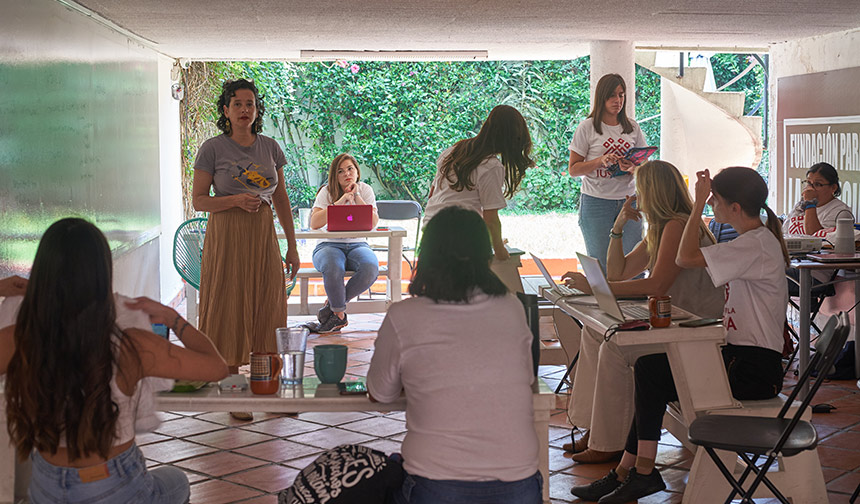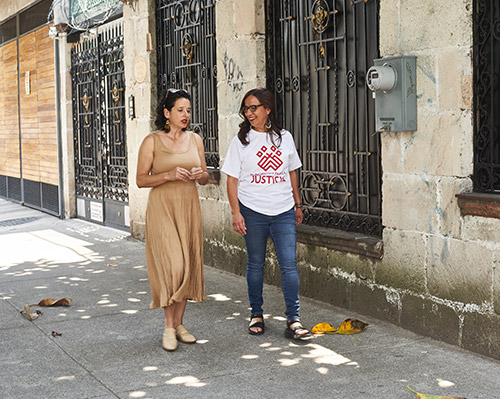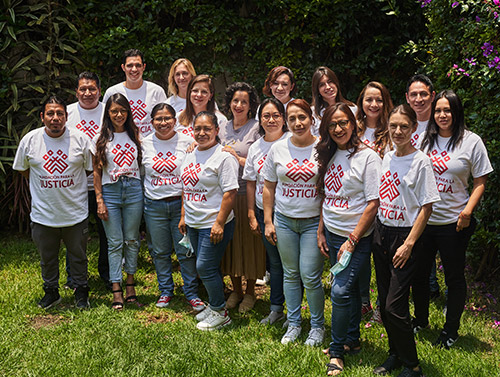
By Gwyneth K. Shaw
For more than 20 years, Ana Lorena Delgadillo has been a protector of the vulnerable — the ultimate defender of those without the tools and resources to stand up to injustice in Mexico. She and her organization, Fundación Para la Justicia (Foundation for Justice), represent the families of migrants and others who have been killed or disappeared, often at the hands of government officials or the nation’s drug cartels. It is painstaking and painful work, but Delgadillo is unshakably committed.
So when she finally won a years-long fight to open records of the investigation into the 2011 San Fernando massacre, in which nearly 200 people were dragged off buses and murdered, it was exhilarating. Until she got some shocking news: She and her organization were also being scrutinized as part of the organized crime probe, and investigators had been spying on them, tracking their phone and text records.
Delgadillo wasn’t the only target: Mexican journalist Marcela Turati and Argentinian forensic anthropologist Mercedes Doretti, who were working with the foundation, were also under surveillance.
The revelation left Delgadillo, who happened to be in the United States when she heard, reeling. She and her team had found mistakes in the larger investigation, and pressed officials to do right by the victim’s families. Instead of a reward, they got retaliation.
“I cannot explain how I felt about my cell phone — I wanted to throw it away, it felt like it was burning on my hands,” she says. “It was very hard for me to get the confidence to use it again.”
Delgadillo knew the move was designed specifically to get her off the case, since anyone under investigation in a case can’t also serve as a lawyer for victims. She still felt the personal insult keenly.
“They did that not because of me, but because of what I do, what I represent, and what the Foundation for Justice represents,” she says. “But it is not easy to open a file when you are the lawyer that represents the victims and find out that they used victims to criminalize me.”
Global reach, ongoing problem
Delgadillo’s story is an increasingly common one in the international circle of advocates for human rights. In recent years, several high-profile cases have grabbed attention, such as the 2018 murder of Washington Post columnist Jamal Khashoggi by a Saudi Arabian hit squad after he had become increasingly critical of the kingdom’s government.

Last year, news broke that a team of international investigators brought in to unravel another atrocity in Mexico, involving the 2014 abduction of 43 college students by the police, had been targeted for electronic surveillance using Pegasus spyware. Developed by an Israeli company, Pegasus has been entangled in investigations all over the world.
“This is a global issue. Governments and private companies increasingly use surveillance technology against rights defenders,” says Roxanna Altholtz ’99, co-director of Berkeley Law’s International Human Rights Law Clinic (IHRLC), which has worked with Delgadillo and her group for several years. “The Mexican government would like to present the cartel as the problem, but the reality is that it is no longer possible to distinguish between the cartels and the government. State agents are collaborating with cartel members in pursuit of economic interests.
“And the state is targeting rights defenders and journalists who are exposing state kleptocracy.”
Altholz, IHRLC Co-Director Laurel E. Fletcher, and students working with the clinic helped Delgadillo file a criminal complaint against the Mexican attorney general’s office for illegal surveillance. They also developed a key argument from the international human rights perspective: that the government violated not only the rights of the investigation’s targets, but also those of the victims, since resources were diverted from finding the truth about the massacres.
“This organization, and others, are coming under increasing pressure from the government — and are really in the crosshairs of a government with some truly authoritarian tendencies,” Altholz says.
Delgadillo says Altholz and Fletcher were among the first she spoke to after finding out her organization was being investigated.
“I trust them very much as lawyers and human rights defenders,” she says. “And as soon as I talked to them, they offered all the support I needed to face all of this legally.”
A new perspective
Altholz, Fletcher, and clinic students began analyzing all the human rights violations that had occurred, parsing the relevant Mexican legislation, and drafting memos that became the foundation for the lawsuit, Delgadillo says.
“They gave us a different perspective on how we should defend ourselves,” she says. “Especially with the students, it was very inspiring to me that they didn’t know me but they were putting in so much time and effort.

“All the time we felt that we were not alone — even though they were far away physically, they were connected to us.”
Madelaine Altman ’23 is one of those students. During the fall semester, she worked on a team analyzing the international obligations states owe to human rights defenders like Delgadillo. This spring, her team examined the international law related to privacy protections for defenders who are subject to surveillance, particularly whether Mexico’s laws meet international standards.
“This was some of the most difficult work I did in the clinic over the last year; surveillance technology evolves much faster than the laws regulating it,” Altman says. “This portion of the project was an excellent lesson in legal objectivity, explaining in clear terms the current state of the law, and keeping note of how we hope it evolves.”
Delgadillo says she was impressed at how well the students grasped the universality of human rights, and the need to stand up for freedom everywhere.
Those values are at the center of the clinic’s mission, Fletcher says.
“We advance human rights by working shoulder-to-shoulder with front-line advocates. Students learn to harness abstract principles of international law to do justice in specific cases,” she says. “In fact, students assigned to another project threw themselves into last-minute research on the complaint. This wasn’t just esprit de corps at work, it was the expertise of students at work.”
Altman felt privileged to be able to work with a client like Delgadillo in law school. She says her work with the clinic is not only her most meaningful experience in law school, but the inspiration for her to work in international human rights law after graduation — as well as this summer, during a stint at the U.S. Department of State Office of the Legal Adviser.
“I am certain I will rely on the knowledge, skills, and connections I made during my year in the clinic as I enter my post-graduate career,” she says.
Accepting the unimaginable
Delgadillo and her organization continue to fight for clients and the larger cause. She says she sometimes wants to be stronger and pretend the situation hasn’t affected her, but she must be honest and accept that she is vulnerable, and a victim of the state.
“I’ve thought to myself, why shouldn’t I be a victim in a country where we have more than 100,000 victims of disappearances, and more than 300,000 victims of killings — in a country where you don’t have justice?”
She’s tried to learn that the vulnerability can give her strength and courage. She also sees her situation as another opportunity to show the Mexican and international communities that these institutions must be changed to work for victims, not against them.
Facing the victim’s families was the hardest part, Delgadillo says, because she feared she had let them down. But their response was one more reminder of the importance of the larger mission, within Mexico and internationally.
“Their response was amazing. They told me, ‘The Foundation for Justice and the Argentine team were the first to come to our country and help us to move Mexican government … and now we have something in common, we are from the same bond. Now it is our turn to be your lawyers,’” Delgadillo says. “That touched my heart very deeply, and I feel the same way about all the support we’ve gotten, from the clinic, from NGOs in Mexico, from advocates all over the world.
“Even though they were trying to take me away from the defense of the families, they did not succeed.”